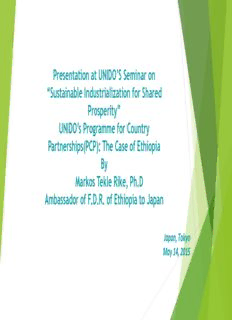Table Of ContentPresentation at UNIDO’S Seminar on
“Sustainable Industrialization for Shared
Prosperity”
UNIDO’s Programme for Country
Partnerships(PCP): The Case of Ethiopia
By
Markos Tekle Rike, Ph.D
Ambassador of F.D.R. of Ethiopia to Japan
Japan, Tokyo
May 14, 2015
Presentation Outline
Introduction: National Development Priorities and
I.
Industrial policy
Growth and Transformation Plan (GTP)
II.
Industrial Development Strategies
III.
Programme for Country Partnerships (PCP) in Ethiopia
IV.
V. Ethiopian Government‘s commitment to promote
V.
Programme for Country Partnerships (PCP)
VI. Scaling up investments for PCP Ethiopia projects
VI.
UNIDO Projects Funded by Japan
VII.
Business and investment promotion activites by UNIDO
VIII.
ITPO Tokyo office and Ethiopian Embassy in Tokyo
I.
Introduction: National Development
Priorities and Industrial policy
Ethiopia aspire to embrace manufacturing since 1920s
the sector started to get momentum in the 1950s (after brief disruption in the
WWII period)
Manufacturing Industry intensified in the 1960s
Successive regimes adopted different policies for the development of industry
Dictatorial military regime discourage private sector and hampered the growth of
infant industry
Nationalized enterprises run inefficient industries with state subsidies and heavy
protection
Private enterprises reduced to small and micro levels
Various industrial development planes failed including the 10 year perspective plan
Introduction: cont...
The first decade (1991-99) marked by various reforms reversing
the command economy
Implemented three phases of IMF/WB sponsored reform
programs
In 1998 government adopted Export Promotion Strategy
Privatization of previously nationalized industries
(inefficient ones)
A full-fledged Industrial Development Strategy (IDS) was
formulated in 2002/03
Introduction cont…
Concretized into action by various sub-sector strategies and by
the successive development plans such as;
Sustainable Development and Poverty Reduction Program
(SDPRP) 2002/03-2004/05 and
the Plan of Action for Sustainable Development and
Eradication of Poverty (PASDEP) 2005/06-2009/10.
The Growth and Transformation Plan (GTP) 2010/11-15/16
Agricultural Development Led Industrialization (ADLI) :
a two-sided strategy, integrating:
• External sector (export -led part)
• Internal sector (forward and backward relationship b/w
agriculture and industry)
II. Growth and Transformation Plan (GTP)
Growth and Transformation Plan (GTP)I (2010/11 -2014/15); GTP 2
(2015-2020) under preparation
The first of a three five-year plan to propel the country toward a
climate resilient middle income status
Places special emphasis on agriculture and rural development,
industry, infrastructure, social and human development, as well
as democratization and good governance
The Growth and Transformation Plan (GTP) has the following
main Objectives:
Maintain at least an average real GDP growth rate of 11% and
attaining of MDGs;
Expand and ensure the qualities of education and health
services sectors and achieve MDGs in the social sectors;
GTP cont…
GTP cont…
Establish suitable conditions for sustainable nation buildings
through the creation of stable democratic and
developmental state; and
Ensure the sustainability of growth by realizing all the
above objectives with in the stable macroeconomic
framework.
GTP sets ambitious targets for improvements in trade logistics
by rolling out the authorized economic operator programme
across export-oriented industry parks, and by improving the
main export corridor to Djibouti.
III. Industrial Development Strategies
Three policy documents are prepared to
guide intervention in industrial development:
The Industrial Development Roadmap (IDR)
provides a strategic framework for industrial
development for the next ten years;
The Industrial Development Strategy Plan (IDSP)
defines strategies, programs and projects for the
implementation of IDR; and,
The Industrial Development Institutional Setup
(IDIS),
provides an institutional framework for industrial
development.
The Industrial Development Strategy (IDS) principles
The IDS is based on a broader development vision - ADLI
The philosophy of ADLI is that agriculture development
plays a leading role in the industrialization process by
preparing various conditions for full-fledged
industrialization
Primary principle of IDS is the linkage b/n industry &
agriculture
Other principles
Export oriented sectors should lead the industrial
development and be given priority
Labor intensive sectors also be given priority to maximize
employment
Public-private partnership – gov’t not merely as a
facilitator but also as a leadership
Description:The philosophy of ADLI is that agriculture development plays a leading role in the industrialization process by preparing various conditions for full-fledged industrialization. Primary principle of IDS is the linkage b/n industry & agriculture. Other principles. ❑Export oriented sectors should le

